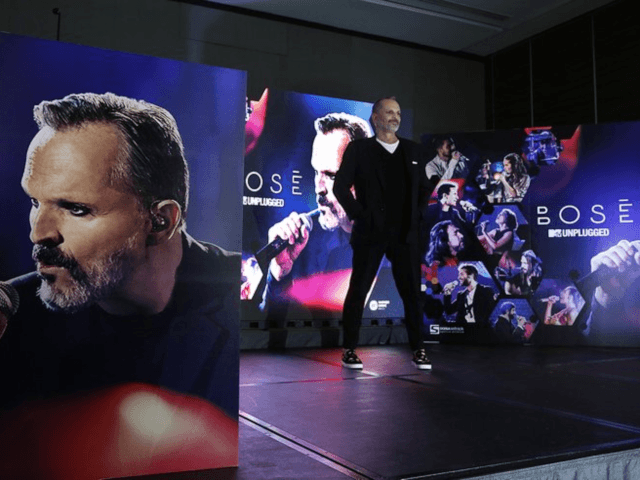Spanish actor, artist, and pop icon Miguel Bosé – a household name in Latin America for decades – has launched a pressure campaign to elicit action from U.N. High Commissioner for Human Rights Michelle Bachelet that culminated with the singer storming the hotel housing her in Mexico on Tuesday, demanding she break her silence on the crisis in Venezuela.
Bachelet, who previously served as the socialist president of Chile, once referred to Venezuelan dictator Hugo Chávez as “a great friend and great colleague” and has prompted criticism for being insufficiently critical of current dictator Nicolás Maduro. Later on Tuesday, Bachelet announced that she was planning a trip to Caracas to observe the human rights situation there, but had not yet set a date to visit.
Bachelet has not addressed Bosé’s repeated demands for her to act on the issue or his visit to her hotel in Mexico City.
Bosé has become one of the most vocal voices in the Spanish-speaking world calling for an end to the socialist dictatorship in Venezuela, which has triggered the largest migrant crisis in the history of Latin America and left millions struggling to find food, water, and medicine for their families. On Twitter and Instagram, Bosé began using the hashtag #BacheletDondeEstas (“Bachelet where are you?”) for a series of tongue-in-cheek videos in which the artist appears to be searching for her around the world. One video depicts a koala with audio superimposed to make it appear that the koala is calling for Bachelet; in another, Bosé appears to have a nightmare in which he is calling out her name.
Me está quitando el sueño. No va a Caracas. Me han dicho. #BacheletDóndeEstás pic.twitter.com/pj1dTorvMi
— Miguel Bosé (@BoseOfficial) April 6, 2019
On Tuesday, Bosé’s videos ceased being comedic, as he appeared to approach the actual hotel Bachelet is staying in during a visit to Mexico this week and demanded that the concierge call her and ask her to meet him. The concierge calls her room but tells Bosé that no one is there.
#BacheletDóndeEstás pic.twitter.com/xVWWGEigGJ
— Miguel Bosé (@BoseOfficial) April 8, 2019
Bosé also notably referred to Bachelet as a “coward” this month for not using her authority to rally the world against Maduro.
The pressure campaign has received mixed reviews. Those who support the restoration of freedom to Venezuela have expressed appreciation for Bosé’s advocacy; others have complained that the videos are bizarre and questioned whether Bosé – who has for decades cultivated an eccentric image – is in a good state of mental health. Maduro supporters and socialists online have also taken to calling Bosé various Spanish-language homophobic slurs for his history of embracing androgynous fashion.
The Spanish newspaper El Mundo notes that the struggle to get Bachelet’s attention on the Venezuela issue is a personal one, as Bosé helped Bachelet campaign for Chilean president over a decade ago. Bosé attended a 2006 campaign rally and performed his hit “Te amaré” (“I Will Love You”) in her honor and met with her during her presidential term in 2005 and 2008.
Bosé began his career as an actor in 1971 – taking after his mother, Italian actress Lucía Bosé – but shifted towards music later in the decade. He is one of Spain’s best-selling artists, with hits that span the 1970s, ’80s, and ’90s. In 2007, he released an album of duets of his greatest hits titled Papito, which received a platinum certification in Italy, Spain, Mexico, and the United States.
Bosé was one of the biggest acts to attend February’s “Venezuela Aid Live” concert on the border in Cúcuta, Colombia, an event organized by British tycoon Richard Branson to generate funding to buy food and medicine for Venezuelans. He also used that occasion to demand that Bachelet act – in this case, pressure Maduro to allow humanitarian aid to enter the country. As the Maduro regime refuses to acknowledge that its socialist policies have created a dire humanitarian crisis, it has blocked all aid from entering the country save for some small amounts of Chinese medicine.
Bachelet vowed to travel to Caracas on Tuesday.
“We are looking at what is the best date to go. The first thing we want to ensure is that a visit by me will allow for an open space to communicate and relate with all the actors involved so that it is a visit that actually makes sense,” Bachelet told reporters in Mexico. She went on to express “deep concern for the reduction of democratic space” in Venezuela.

COMMENTS
Please let us know if you're having issues with commenting.